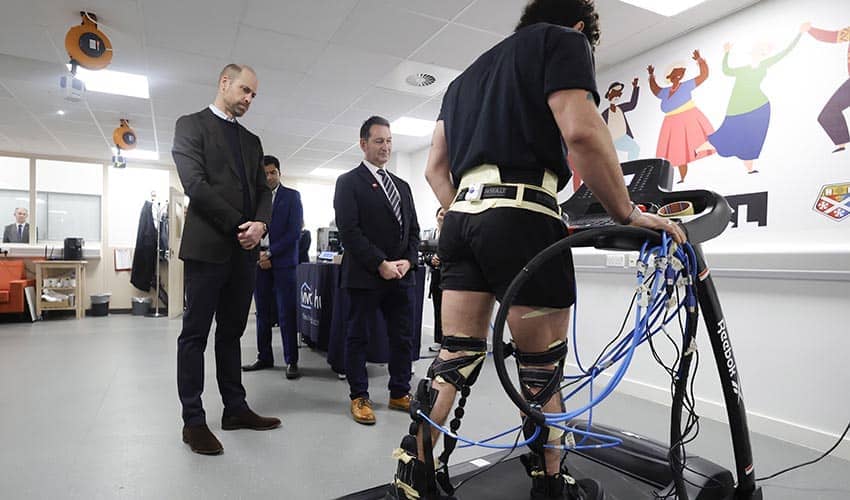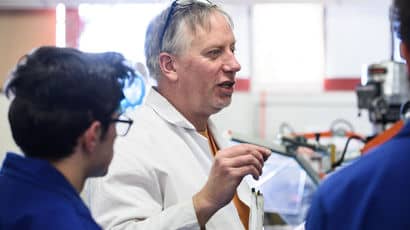UWE Bristol academic unveils breakthrough in energy-efficient AI at NATO science forum

Dr Jonathan Lancelot, senior lecturer in cyber security at UWE Bristol, has developed a new form of artificial intelligence (AI) that could transform how intelligent machines operate in space, defence, and remote environments where power and computing resources are limited.
His research explores how the next generation of AI systems can think and adapt more efficiently, paving the way for future robots, satellites and autonomous systems that are both smarter and more energy efficient.
In future, this kind of AI could help everything from drones to space probes last longer and make smarter decisions without relying on large data centres or constant communication with Earth. It could also lead to more sustainable smart devices and reduce the environmental footprint of AI, which currently consumes vast amounts of energy worldwide.
Dr Lancelot was invited to present his groundbreaking research at a NATO Science and Technology Organisation (STO) forum – an international platform that brings together scientists, engineers and defence experts from across allied nations. The event was led by the UK’s Defence Science and Technology Laboratory (Dstl) and the NATO alliance, and delivered in partnership with the UK Space Agency.
His research introduces a new binary neural network (BNN) framework – an approach that replaces complex mathematical calculations with simple logical operations. This makes AI faster, more efficient, and capable of running on minimal computing resources without losing performance.
“Traditional AI models depend on heavy, power-hungry computations,” said Dr Lancelot. “This approach proves that intelligent behaviour doesn’t have to come at excessive cost. By combining binary logic with an adaptive learning layer, we can achieve high precision while dramatically cutting energy use.”
The innovation lies in a technique called dynamic fractional stride-based feature capture, which helps the system retain the accuracy usually lost when simplifying AI models into binary form. This means the network can still ‘pinpoint’ by making accurate decisions – even with reduced computational resources.
The result is a breakthrough in energy-efficient AI, with significant implications for aerospace, defence, and other sectors where reliability and endurance are critical.
For example, autonomous satellite operations need smart optical components that have the ability to seek accurately without the loss of detail and succeed in preserving onboard power. The implications for collective defence are significant, as satellites will have the capability to map contested areas in real-time, improve hazard detection and detect attacks against critical GPS or weather satellite constellations in space.
“Speaking at NATO was a true honour and a chance to share how research at UWE Bristol is helping shape the future of collective security and efficient AI,” said Dr Lancelot. “Our aim is to build intelligent systems that can think and adapt even in the most challenging conditions.”
The NATO forum also highlighted the growing convergence of space and cyber-physical operations. Alongside traditional concerns about protecting satellite constellations, participants examined the threat posed by space weather events that can disrupt the Earth’s critical communication and navigation infrastructure.
“Research at UWE Bristol has the potential to make a significant contribution to collective and UK defence in this area, particularly through the development of adaptive AI technologies capable of supporting resilient, autonomous systems in complex environments,” added Dr Lancelot.
The NATO event gathered experts to discuss emerging advances in cyber security, artificial intelligence and space operations. Dr Lancelot’s contribution highlights UWE Bristol’s growing engagement in international research collaborations that link academic innovation with practical, real-world impact.
Related news

18 February 2026
Immersive theatrical reimagining of Moby Dick brings unique creative captioning to a live audience
An experimental theatre experience by UWE Bristol lecturer Sharon Clark and artist Jack Hardiker-Bresson uses creative captions for accessible storytelling.

05 February 2026
Spike Print Fair launches in partnership with UWE Bristol
Printmakers working across all techniques and formats are invited to apply to exhibit at a new three-day printmaking fair at Spike Island from 24 – 26 July.

23 January 2026
On-demand minibus services beneficial in rural areas but face financial challenges, trials suggest
Trials of ‘demand responsive transport’ minibus services boosted connectivity for people in rural and suburban areas, according to a new report produced by UWE Bristol researchers.

22 January 2026
Prince of Wales visits UWE Bristol to see pioneering robotic tech tackling societal health challenges
The Prince of Wales visited the Bristol Robotics Laboratory (BRL) at the University of the West of England’s (UWE Bristol) Frenchay campus today (22 January 2026) to learn about the pioneering robotic technologies being developed to help the ageing and disabled population maintain mental and physical wellbeing and remain independent for longer.

19 January 2026
UWE Bristol academic to help shape new national Art and Design curriculum for England
A UWE Bristol academic has been appointed by the Department for Education to draft a new national curriculum for Art and Design.

12 December 2025
Arnolfini appoints Professor Paul Gough as new Chair of Trustees
Arnolfini, partner organisation of UWE Bristol, has appointed Professor Paul Gough as its new Chair of Trustees.

12 December 2025
UWE Bristol’s environmentally conscious and student-focused accommodation wins three awards
Purdown View, the world's largest certified Passivhaus student accommodation development, has been recognised at Property Week Student Accommodation Awards.

11 December 2025
Picture perfect: Graduate Chloe Barnes wins Sky Arts Portrait Artist of the Year 2025
Artist Chloe Barnes has won Sky Arts Portrait Artist of the Year 2025, earning a £10,000 commission from The Royal Society.

11 December 2025
Social media influencer work is far more demanding than it looks, research finds
A study exploring the mental health impacts of social media influencer work has revealed that life online is far more demanding than it appears.

25 November 2025
UWE Bristol experts join film Q&A exploring music and melodrama
Academics will take part in the Cary Comes Home Festival, with a post-screening Q&A exploring music, melodrama and emotional storytelling in classic cinema.

25 November 2025
Health-tech start up MyCelsius launches breakthrough cooling tech for hot flushes developed at UWE Bristol’s Launch Space
A pioneering Bristol-based health-tech company developing cutting-edge cooling technology for hot flushes has credited UWE Bristol’s Launch Space incubator with playing a key role in accelerating its product development.

24 November 2025
Graduate’s winning design to feature on Brabazon Hangar
UWE Bristol and YTL Developments have teamed up to run a student design competition for a large-scale artwork at the Spitfire Community Hangar at Brabazon.
You may also be interested in

Media enquiries
Enquiries related to news releases and press and contacts for the media team.

Find an expert
Media contacts are invited to check out the vast range of subjects where UWE Bristol can offer up expert commentary.






